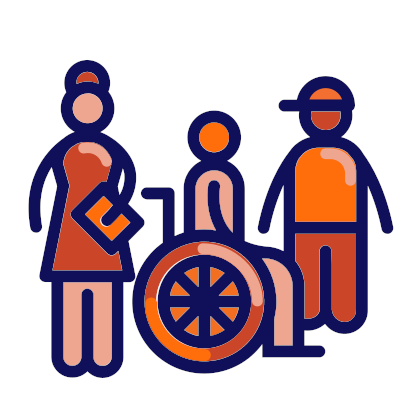Tackling discrimination

Schools can tackle discrimination by promoting democracy, respect for human rights and citizenship.
To ensure that all students’ needs are met equally, schools need to prioritise language and cultural competences, multiperspectivity in history and gender equality. In this way, students can acquire competences for democratic culture, to fulfil their potential in school as well as in society.
Facts & figures
Students with disabilities in Europe have higher early-school leaving-rates than their same-age peers.[1]
Black Caribbean students are three times more likely to be excluded from English schools than white pupils. [2]
A survey of nine EU countries showed that 33% of Roma students were in schools where most pupils were Roma, with 13% in Roma-only schools.[3]
What is discrimination?
Discrimination is treating a person badly or unfairly on account of a personal characteristic, such as national, ethnic or social origin, gender, language, religion, disability or sexual orientation.
There are two basic forms of discrimination:
- Direct discrimination – treating someone less favourably than you treat or would treat another person in the same situation, e.g., a school refusing to admit a student because they are Roma,
- Indirect discrimination – applying a provision, criterion or practice in the same way for all of a group which has the effect of unfairly disadvantaging people in the group who share a particular characteristic, e.g., a school uniform policy banning headgears for girls and boys may unfairly disadvantage Muslim girls and Jewish boys.
Discrimination can occur in almost any aspect of school life, from the attitudes and expectations of teachers to school rules and codes of conduct, selection and grouping practices, curricula, teaching methods and materials, changing facilities, career guidance, canteen food and the physical school environment.
Whatever form it takes – whether it be parallel school systems for different ethnic groups, concentrations of minority or disadvantaged children in the same school, or differential access to educational provision, it means a lower quality of educational experience for the students being discriminated against.
Why is tackling discrimination important at school?
Discrimination is a human rights violation. Article 14 of the European Convention on Human Rights contains a prohibition on discrimination with respect to any of the rights and freedoms guaranteed under the Convention. Article 2 of Protocol No.1 requires the state to ensure that all individuals have access to its formal educational provision.
“No person shall be denied the right to education.”[4]
“The enjoyment of the rights and freedoms set forth in this Convention shall be secured without discrimination on any ground such as sex, race, colour, language, religion, political or other opinion, national or social origin, association with a national minority, property, birth or other status.”[5]
Tackling discrimination is not simply a duty laid on schools by the European Convention of Human Rights, it is also important for student well-being and educational success. Children and young people who are treated unfairly or discriminated against are more likely to have:
- negative attitudes to school
- lower levels of motivation and academic achievement
- a higher risk of dropping out of formal education
- experience of bullying
- mental health problems.
Feeling different or ‘less’ than others can be an isolating experience. Over time it undermines an individual’s capacity for participation in society, e.g., their sense of self-efficacy, openness to other cultures and beliefs, tolerance of ambiguity and flexibility and adaptability - all of which lie at the heart of the Council of Europe Reference Framework of Competences for Democratic Culture.
Lack of opportunity due to discrimination in school also damages society. It intensifies social divisions, fuels xenophobia and intolerance and undermines social cohesion.
“States should adopt a combination of strong anti-discrimination measures and policies that promote more inclusive education systems where all children learn together. This is not a utopian project, but an achievable goal that can ensure more equal treatment of all children and, in the long term, improve social cohesion”[6]
What are the challenges?
One of the challenges facing the tackling of discrimination in schools is a lack of data. European-wide statistics specifically focused on discrimination in schools are scarce. Children with disabilities, for example, do not always appear in national statistics and may be ‘invisible’ to decision-makers, service providers and the public. Such children are particularly vulnerable to discrimination, however, and are often segregated in terms of educational provision.
These are not the only ‘invisible’ minorities in schools. For example, LGBTI students often feel they have to hide their sexual orientation at school to avoid victimisation.
Another key challenge is the existence of negative stereotypes about minority groups among teachers, parents, students and other school stakeholders. Such stereotypes are often deeply embedded in everyday school life and practice, so much so that they are taken as ‘normal’, e.g., stories and images in textbooks that reflect a stereotyped portrayal of the roles of women and men, girls and boys. Stereotypes help to fuel prejudiced and aggressive behaviour between students, lower expectations from teachers and negative attitudes from parents, e.g., refusing to allow their children to be taught alongside refugee or migrant children.
Stereotyping is difficult to root out in schools because its origins lie in wider society. This is exacerbated by the current preponderance of hate speech, fake news and conspiracy theories in digital media, especially social media.
The situation is compounded when minority groups are under-represented on school staff. Students lack role - models and teachers do not have the access to information about or insights into other cultures and ways of life that come with belonging to a more diverse profession. They lack the intercultural competences with which to create inclusive and quality learning environments, e.g., openness to cultural otherness, tolerance of ambiguity, plurilingual skills and knowledge and critical understanding of alternative cultures, religions and histories.
Tackling discrimination is more challenging when there is a lack of dialogue between schools and parents. Often this is on account of language difficulties, but it is also a problem where students’ parents work abroad leaving their children in the charge of elderly relatives or others.
How can schools get active?
Ensuring all learners of any age are provided with meaningful, high-quality educational opportunities alongside their peers requires a whole-school approach.
It begins by schools understanding who might be at risk of discrimination, what they can do to minimise discrimination and how they can support students at risk of discrimination. A good place to start is with an assessment of the current situation, identifying the strengths that exist in the school, but also needs and priorities. Consulting with school stakeholders is essential, especially students and, where possible, parents – e.g., using surveys, questionnaires, focus groups, etc. Given the sensitivities involved there is argument for collecting information on individuals’ experiences of discrimination anonymously.
Based on an assessment of the current situation it is possible to identify immediate priorities for policy development. Priorities will vary with the school, but might include, for example:
- language development
- gender equality
- accessibility of the physical environment
- intercultural competences.
The setting of initial priorities should go hand in hand with professional development for senior leadership teams as well as teaching staff. An element of personal as well as professional reflection is essential to the tackling of discrimination in school. In particular, it is important for school staff to be able to consider their own beliefs and values with regard to discrimination, including their own unconscious biases and prejudices.
Schools can then turn to the longer-term aspiration of creating a culture of non-discrimination. Central to this process is the challenging of negative stereotyping, both in classrooms and around the school. This can be done in a variety of ways, including:
- challenging stereotypes when they are heard
- discussing stereotypes with students
- identifying stereotypes in the curriculum
- highlighting stereotypical images and roles in textbooks
- allocating posts of responsibility equitably
- choosing different ways of dividing up students
- providing a range of role-models
- setting up mechanisms for monitoring incidents of discrimination.
Challenging stereotypes goes alongside the promotion of inclusion and an appreciation of the benefits of diversity in school life. This can take different forms, including:
- using inclusive language
- including human rights, democratic citizenship and intercultural education in the curriculum
- encouraging the discussion of controversial issues
- promoting student voice
- involving students in peer education and peer mediation activities
- welcoming parents and involving them in school decision-making
- forming partnerships with different organisations and groups in the community.
[1] Education section of the The European Disability Forum
[2] Article: UK: Racial discrimination is a reality in schools and classrooms. Education International
[3] EU Fundamental Rights Agency, “Second European Union Minorities and Discrimination Survey (EU-MIDIS II) Roma – Selected findings” (2017).
[4] ECHR, Article 2, Protocol No.1
[6] Position paper: Fighting school segregation in Europe through inclusive education by the Council of Europe Commissioner for Human Rights
 Resources on Tackling discrimination
Resources on Tackling discrimination
 Related schools projects
Related schools projects
Address: Sachkhere Municipality Village Sairkhe
Country: Georgia
Project: “We Choose Democracy”
 Working language during the project:
Working language during the project:
- Georgian,
- English
 Themes of the Council of Europe project “Free to Speak, Safe to Learn - Democratic Schools for All” covered:
Themes of the Council of Europe project “Free to Speak, Safe to Learn - Democratic Schools for All” covered:
- Making children’s and students’ voices heard
- Preventing violence and bullying
- Improving well-being at school
 Competences from the Reference Framework of Competences for Democratic Culture (CDC) addressed and where / how they were integrated:
Competences from the Reference Framework of Competences for Democratic Culture (CDC) addressed and where / how they were integrated:
- Civic-mindedness
Implemented Activities:
1) Lecture-seminar - "What is an election"? What are the basic principles it should be based on, imitation of the election process. This activity is aimed at forming an active civic position among children and young people who do not yet have the right to vote.
2) Summer Camp 2019 " We Choose Democracy". The aim of the summer camps was to raise students' awareness of the following issues: cultural heritage, the importance of civic activism, its forms, types of bullying and healthy living, ways of resolving conflicts, discussions, question-and-answer sessions, motivation, involvement.
3) November 20 is the International Day for the Prevention of Violence against Children! The event was organized with the active involvement of students with special educational needs.
4) Meeting the Inspectors.
Organized by the School Civic Education Club, a meeting was held at the school with the inspectors of the Ministry of Internal Affairs, the topic of the meeting was "Protection of Children's Rights and Prevention of Violence and Crime"
5) "Visiting the Patrol Police"
Members of the Civic Club visited the Patrol Police Department and became acquainted with the Principles of their work.
6) A Visit to Sachkhere District Police Department. Topic: "No to Violence"
Officers from the police department introduced the students to types of violence.
7) Visiting the TV company "Rioni"
The leader of the Civic Club was invited to talk about violence against women on TV in Rioni, and the students filmed a video on the subject.
8) Meeting with the representative of the Ministry of Defense, topic "No to Violence"
We invited representatives of the Ministry of Defense to talk about violence.
9) Flipped classroom
Flipped classroom teaching method helps the teacher to develop independent thinking, search and other much needed skills. In this modified version of the method is the "Flipped lesson" that helps the teacher see himself from the student's position.
10) International Day Against Bullying
May 4 is the International Day against Bullying. Our school joined the initiative, the students solemnly opened the week, during which they organized a marathon, created posters, organized presentations and handed heart-shaped badges to each other as a sign of love and support ️.
11) Prosper Merimee "Matteo Falcone" - Book Review
Prosper Merimee's "Matteo Falcone" was discussed by members of the School Civic Education Club. Students drew a parallel with Akaki Tsereteli's "Gamzrdeli" and Alexander Kazbegi's "Khevisberi Gocha" All the main characters are committed to the community's way of life and its morals. Nevertheless, each of them violates the law of the community in their own way.
12) Meeting with Sachkhere District Prosecutor, Topic: No to Violence "
Members of the Civic Education Club invited the city prosecutor as part of the project, the topic of the seminar was "No to Violence"
13) June 1 is Child Protection Day! On this day, the management of the school was handed over to the students, they took over teaching and gave lessons to the juniors.
14) Movie “A dream Tree” Showing / Discussion - Analytical and critical thinking skills
Implemented Activities:
1) Small Grants Competition:
In addition to the technical equipment, the purpose of the "Why Democracy" competition was to develop students' research and search, project work, analytical and critical thinking skills.
2) Online discussion on the topic: ‘Why Democracy ?! ’
The discussion was held at Microsoft Teams, by the School Civic Education Club, with the aim of raising awareness of democratic competencies, studying and comparing examples from different democratic countries, substantiating one's own opinion, and promoting critical thinking.
3) "My favourite book"
The Civic Education Club organised a book presentation at the school, the club members introduced their favourite books to the listeners and explained why they liked this or that book and what impact it had on them.
4) "One book to school"
The School Civic Education Club launched the One Book School initiative. Students visited families in the Sairkhe community and collected books for the school library.
5) Meeting with the school librarian
The members of the Civic Education Club were trained by the school librarian on how to care for the books (how books are collected, stored and cared for in the library) in order to promote the book.
6) Exhibition "Sayings of famous people about democracy"
Within the framework of the project, the Civic Education Club organized an exhibition / presentation on democratic competences, as well as the speeches of famous people on democracy. At the end of the activity, an online exhibition was created. - Knowledge and critical understanding of the world: politics, law, human rights, culture, cultures, religions, history, media, economies, environment, sustainability
Implemented Activities:
1) The European Day of Languages
The European Day of Languages was celebrated with the aim of making students understand that linguistic diversity is an instrument for achieving a high level of mutual understanding between cultures and an essential element of the rich cultural heritage of our continent.
2) Europe Day Celebration
This aims to help students become global-minded, international citizens, learn about the traditions of different countries and share their diverse cultures.
3) International Book and Copyright Day
April 23 is the International Book and Copyright Day, this day was also celebrated by our school and on 23 April 2019, the elementary school teacher conducted a very interesting lesson in the 4th grade.
 Target group age range:
Target group age range:
- 5 - 11
- 11- 15
- 15 -19
 Level of education:
Level of education:
- Primary education
- Lower secondary education
- Upper secondary education
Short description of the project:
The project aimed to present democratic values that we find in Georgian classical or folk literature, historiographical works, legal monuments, ethnographic traditions, letters from public figures and other materials. Each approach to the issue was different: conducting research, finding and disseminating materials through various channels, including popular social networks, blogs.
The project is the result of two years of work. Our goal was to see how compatible democratic values are with Georgian culture. To answer this question, we tried to find traces of democratic values in different layers of Georgian culture. Within the framework of the project, various activities were carried out, which included the following topics: literature and prose, law, customs, cinema, theatrical art, polemics, which were held in the Georgian press in the 19th century in connection with democratic values, humanism and liberalism.
 Aims/objectives
Aims/objectives
Informing students about the basic principles of democracy, values, human rights and freedoms, democratic inclusion;
Students:
- A) see the differences and similarities between different cultures and develop a sense of respect for different cultures;
- B) Improve cognitive, social, information retrieval, information technology and effective communication and collaboration skills.
 Expected results/outcomes
Expected results/outcomes
Students explored information about the basic principles of democracy, values, human rights and freedoms, democratic inclusion.
Developed respect for other cultures, improved communication skills.
Students can define their place and importance in society, collaborate to solve key problems of public safety, can explore the foundations and conditions of peaceful coexistence in society.
Students become acquainted with the different forms of violence, found material on various facts regarding violence and ways to solve it, discussed preventive measures.
 Changes
Changes
Students were able to adapt the information, suggestions and tips obtained and use them adequately and independently.
Students were ready to make the maximum contribution to the group work and provide it with as many useful ideas as possible. They could always listen to, consider and develop suggestions by other members of the group.
Students adequately conveyed the facts, the context and their emotional state. They always followed the rules of conversation / dialogue / discussion and can gave very good input to joint activities for managing work.
Students systematically demonstrated the ability to compromise and could contribute their personal interests if need be. They could identify problems, respond in a timely manner, and deliver constructive criticism. They will be able to admit mistakes and draw conclusions.
 Challenges you faced
Challenges you faced
During the project, of course, there were challenges: meeting the deadlines for the tasks to be presented, the time limit during the implementation of the activities, creating motivation in terms of involvement and interest in the topic.
 Time-frame of the project:
Time-frame of the project:
2018-2020 school years.
 Council of Europe materials on citizenship and human rights education used while preparing or implementing your practice:
Council of Europe materials on citizenship and human rights education used while preparing or implementing your practice:
- Reference Framework of Competences for Democratic Culture
- Living Democracy - manuals for teachers
- Addressing violence in schools through EDC/HRE
- Human Rights and Democracy Start with Us – Charter for All
- Freedom(s) - Learning activities for secondary schools on the case law of the European
- How all Teachers Can Support EDC/HRE: A Framework for the Development of
- Multimedia Material (ex. video “Beat Bullying”, series of cartoons “Democracy and







